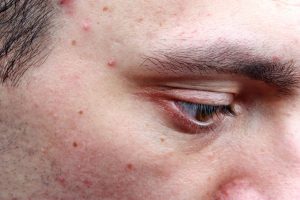
Lead researcher Dr. Simone Ribero said, “For many years, dermatologists have identified that the skin of acne sufferers appears to age more slowly than in those who have not experienced any acne in their lifetime. Whilst this has been observed in clinical settings, the cause of this was previously unclear. Our findings suggest that the cause could be linked to the length of telomeres, which appears to be different in acne sufferers and means their cells may be protected against aging.”
Found at the end of chromosomes, telomeres help protect them against deterioration during replication. As cells age, telomeres gradually break down, which ultimately results in the death of the cell.
Senior author Dr. Veronique Bataille explained, “Longer telomeres are likely to be one factor explaining the protection against premature skin aging in individuals who previously suffered from acne.”
Dr. Ribero added, “By looking at skin biopsies, we were able to begin to understand the gene expressions related to this. Further work is required to consider if certain gene pathways may provide a base for useful interventions.”
The study findings were published in the Journal of Investigative Dermatology.